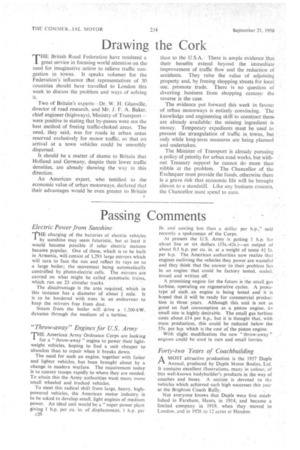Drawing the Cork
Page 86

If you've noticed an error in this article please click here to report it so we can fix it.
THE British Road Federation have rendered a great service in focusing world attention on the need for imaginative action to relieve traffic congestion in towns. It speaks volumes for the Federation's influence that representatives of 30 countries should have travelled to London this week to discuss the problem and ways of solving it.
Two of Britain's experts Dr. W. H. Glanville, director of road research, and Mr. J. F. A. Baker, chief engineer (highways), Ministry of Transport— were positive in stating that by-passes were not the best method of freeing traffic-choked areas. The need, they said, was for roads in urban areas reserved exclusively for motor traffic, so that on arrival at a town vehicles could be smoothly dispersed.
It should be a matter of shame to Britain that Holland and Germany, despite their lower traffic densities, are already showing the way in this direction.
An American expert, who testified to the economic value of urban motorways, declared that their advantages would be even greater to Britain than to the U.S.A.' There is ample evidence that their benefits extend beyond the immediate improvement of traffic flow and the reduction of accidents. They raise the value of adjoining property and, by freeing shopping streets for local -use, promote trade. There is no question of diverting business from shopping centres: the reverse is the case.
The evidence put forward this week in favour of urban motorways is entirely convincing. The knowledge and engineering skill to construct themare already available: the missing ingredient is money. Temporary expedients must be used to prevent the strangulation of traffic in towns, but only while. long-term measures are being planned and undertaken.
The Minister of Transport is already pursuing a policy of priority for urban road works, but without Treasury support he cannot do more than nibble at the problem. The Chancellor of the Exchequer must provide the funds, otherwise there is a grave risk that economic-life will be brought almost to a standstill. Like any business concern, the Chancellor must spend to earn.




































































































































































































































































































































